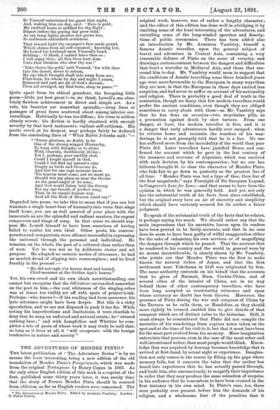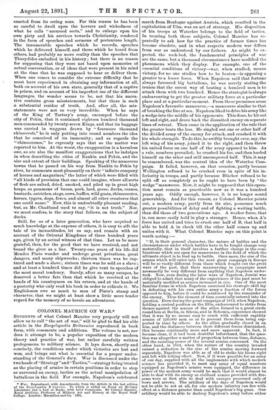THE ADVENTURES OF MENDEZ PINTO.*
Tun latest publication of " The Adventure Series" is by no means the least interesting, being a new edition of the old translation of Mendez Pinto's Peregrinaccio, which was made from the original Portuguese by Henry Cogan in 1663. As the only other English edition of this work is a reprint of the first, published some thirty years later, it was surely time that the story of Perna° Mendez Pinto should be rescued from oblivion, as far as English readers were concerned. The
• The Aduentures of Mendes Pinto. Edited by Arminius Vamlniry. London : 'T. Fisher Unwin.
original work, however, was of rather a lengthy character; and the editor of this edition has done well in abridging it by omitting some of the least interesting of the adventures, and curtailing some of the long-winded speeches and descrip- tions of public ceremonies. There has been added also an introduction by Mr. Arminius Vambery, himself a famous Asiatic traveller, upon the general subject of travel and adventure in Central Asia, containing a very reasonable defence of Pinto on the score of veracity, and drawing a curious contrast between the dangers and difficulties that beset a traveller in Mediaeval Asia, and those that sur- round him to-day. Mr. Vambery would seem to suggest that the conditions of Asiatic travelling some three hundred years ago were more favourable to the European in many ways than they are now, in that the European in those days excited less suspicion, and had never to suffer on account of his nationality and religion. There is probably a good deal of truth in the contention, though we fancy that few modern travellers would prefer the ancient conditions, even though they are obliged sometimes to carry about with them—as Mr. Vambery says that he has done on occasion—two strychnine pills, as a precaution against death by slow torture. From one danger, at least, the modern traveller is free, and it is a danger that early adventurers hardly ever escaped : when he returns home and recounts the wonders of his wan- derings, he is not promptly toll that he is a liar. No one has suffered more from the incredulity of the world than poor Pinto did. Later travellers have justified Bruce, and con- firmed the account which he gave in the last century of the manners and customs of Abyssinia, which was received with such derision by his contemporaries ; but no one has hitherto thought fit to clear the character of Mendez Pinto, who bids fair to go down to posterity as the greatest liar of all time. " Mendez Pinto was but a type of thee, thou liar of the first magnitude," says Foresight of Sir Sampson Legend, in Congreve's Love for Love,—and that seems to have been the opinion in which he was generally held. And yet, not only has the substantial truth of his facts been since established, but the original story bore an air of sincerity and simplicity which should have certainly secured for its author a fairer j udgment.
To speak of the substantial truth of the facts that he relates, is perhaps saying too much. We should rather say that the main impressions that his narrative leaves upon its readers have been proved to be fairly accurate, and that in no case does he seem to have been guilty of wilful exaggeration either for the sake of enhancing his own services or of magnifying the dangers through which he passed. That the services that he rendered to his country and the world in general were by no means inconsiderable, is clearly shown by Mr. Vambery, who points out that Mendez Pinto was the first to make known the natural riches of Japan, and that the first settlement near Yokohama in 1548 was originated by him. The same authority contends on his behalf that the accounts that he gives of Burmah, Siam, Cochin-China, and of several cities of the interior of China, are in no way behind those of other contemporary travellers, who have been long accepted as trustworthy witnesses and upon whose accuracy no doubt has been thrown. Moreover, the presence of Pinto during the war and conquest of China by the Tartars, as he calls them, or Mandshus, as they should more rightly be termed, enabled him to give details of that conquest which are of distinct value to the historian. Still, it must always be remembered that Pinto did not compile the narrative of his wanderings from copious notes taken on the spot and at the time of his visit to it, but that it must have been for the most part evolved from his memory. More imagination enters into that process, even in the case of the moat sober and well-intentioned writer, than most people would think. Know- ledge that was acquired by hearsay becomes knowledge that is arrived at first-hand, by actual sight or experience. Imagina- tion not only comes to the rescue by filling up the gaps where memory fails, but it converts the tales that the author has heard into experiences that he has actually passed through, and leads him, also unconsciously, to magnify their importance in order that they may produce the same sensation of surprise in his audience that he remembers to have been created in the first instance in his own mind. In Pinto's case, too, there were probably ever present before him the demands of his religion, and a wholesome fear of the penalties that it exacted from its erring sons. For this reason he has been so careful to dwell upon the horrors and wickedness of what he calls " accursed sects," and to enlarge upon his own piety and his services towards Christianity, rendered in the form of speeches and sermons of portentous length. The innumerable speeches which he records, speeches which he delivered himself, and those which he heard from others, had probably no more reality than the speeches that Thucydides embodied in his history ; but there is no reason for supposing that they were not based upon memories of actual conversation, or of ideas that were present in his mind at the time that he was supposed to hear or deliver them. When one comes to consider the extreme difficulty that he must have experienced in obtaining any information at all, both on account of his own state, generally that of a captive in prison, and on account of his imperfect use of the different languages, the wonder seems to be, not that his narra- tive contains gross misstatements, but that there is such a substantial residue of truth. And, after all, the mis- statements were not SO very incredible. When he says of the King of Tartary's army, encamped before the city of Pekin, that it contained eighteen hundred thousand men commanded by twenty-seven Kings, and that its baggage was carried in waggons drawn by " fourscore thousand rhinocerots," he is only putting into round numbers the idea that he conceived of its immensity; and as regards the -"rhinoceroses," he expressly says that so the matter was reported to him. At the worst, the exaggeration is a harmless one, as are also the manifest exaggerations that he indulges in when describing the cities of Nankin and Pekin, and the size and extent of their buildings. Speaking of the numerous towns that be passed on his way from Nankin to Pekin by river, he comments most pleasantly on their " infinite company of houses and magazines," the latter of which were filled with 44 all kinds of provision that one could imagine, where all sorts of flesh are salted, dried, smoked, and piled up in great high heaps, as gammons of bacon, pork, lard, geese, ducks, cranes, bustards, ostriches, stags, cows, bullies, wild goats, rhinocerotes, horses, tygers, dogs, foxes, and almost all other creatures that one could name." Now, this is undoubtedly pleasant reading, but, as Mr. Chadband used to say, "it is not truth." Nor, we must confess, is the story that follows, on the subject of ducks.
Still, for us of a later generation, who have acquired so much knowledge at, the expense of others, it is easy to sift the tale of its inexactitudes, let us say, and remain with an account of the Oriental Kingdoms of three hundred years ago, given by an actual witness of that time. Let us be more grateful, then, for the good that we have received, and not brand the giver as a liar. Twenty-one years of his life did Mendez Pinto wander and undergo great privations, great dangers, and many shipwrecks ; thirteen times was he cap- tured and made a slave ; sixteen times was he sold as a slave ; and at least a hundred times did he give vent to speeches of the most moral tendency. Surely, after so many escapes, he deserved a better fate than that which he received at the hands of his countrymen on his return, and at the hands of a posterity who only read his book in order to ridicule it. We Englishmen owe so much to men of Pinto's _stamp and character, that we might at least show a little more tender regard for the memory of so heroic an adventurer.



































 Previous page
Previous page